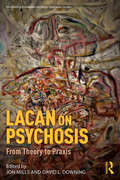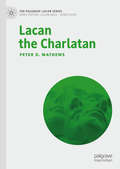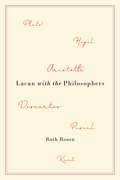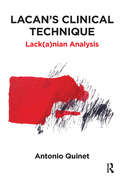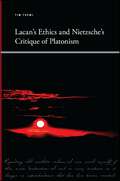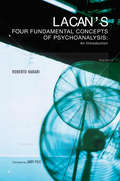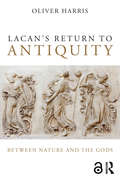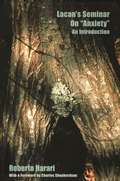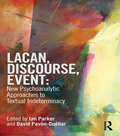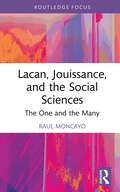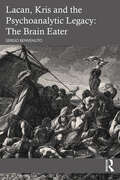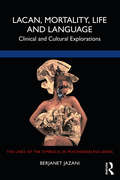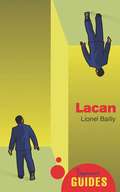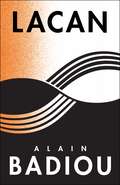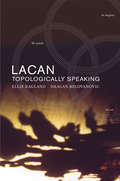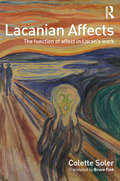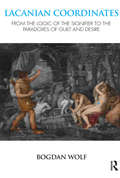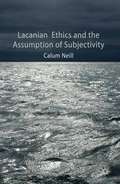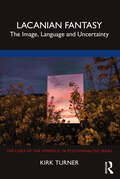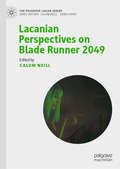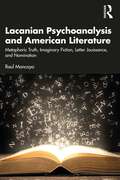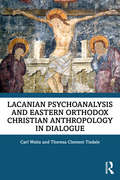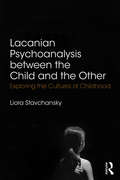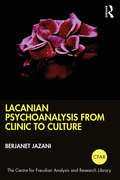- Table View
- List View
Lacan on Psychosis: From Theory to Praxis (Philosophy and Psychoanalysis)
by Jon Mills David L. DowningThis is the first book of its kind that attempts to distill Lacan’s views on psychosis for both a specialized and non-specialized audience. An attempt is made to present Lacan’s unorganized theories to apply to conceptual paradigms in psychoanalysis and the humanities as well as applied clinical practice. This effort is in the spirit of fostering dialogue and educating different theoretical orientations within psychoanalysis on what Lacan and his followers have contributed to emerging contemporary perspectives on psychotic phenomena in both normative and pathological populations. Within Lacanian circles there is debate over what constitutes psychosis, including defining the ordinary from pathological variants that have historically defined the phenomena as a mental illness. Here psychosis is not defined by hegemonic authoritarian psychiatry, but rather as a conceptual framework or philosophical perspective supported by descriptive narrative and symptomatic phenomenology that challenges preconceived notions of what we typically consider psychosis to entail. In this book a variety of perspectives are presented by internationally respected scholars and clinicians who examine what Lacan had to say about psychosis, from his nuanced theories represented in select texts, including omissions, extrapolations, and new applications, as well as how clinical methodology and technique have been adapted and advanced by practitioners treating psychotic individuals. Lacan on Psychosis will be of interest to academics, scholars, researchers, and practitioners in the fields of psychoanalysis, psychotherapy, philosophy, cultural theory, the humanities, and the behavioral sciences.
Lacan the Charlatan (The Palgrave Lacan Series)
by Peter D. MathewsThis book sets out to determine the validity of an accusation made against Jacques Lacan by Noam Chomsky in an interview in 1989. He stated that Lacan was a “charlatan” – not that his ideas were flawed or wrong, but that his entire discourse was fraudulent, an accusation that has since been repeated by many other critics. Examining the arguments of key anti-Lacanian critics, Mathews weighs and contextualizes the legitimacy of Lacan’s engagements with structural linguistics, mathematical formalization, science, ethics, Hegelian dialectics, and psychoanalysis. The guiding thread is Lacan’s own recurrent interrogation of authority, which inhabits an ambiguous zone between mastery and charlatanry. This book offers a novel contribution to the field for students and scholars of psychoanalysis, philosophy, sociology, critical and literary theory.
Lacan with the Philosophers
by Ruth RonenClosely examining Jacques Lacan's unique mode of engagement with philosophy, Lacan with the Philosophers sheds new light on the interdisciplinary relations between philosophy and psychoanalysis. While highlighting the philosophies fundamental to the study of Lacan’s psychanalysis, Ruth Ronen reveals how Lacan resisted the straightforward use of these works. Lacan’s use of philosophy actually has a startling effect in not only providing exceptional entries into the philosophical texts (of Aristotle, Descartes, Kant and Hegel), but also in exposing the affinity between philosophy and psychoanalysis around shared concepts (including truth, the unconscious, and desire), and at the same time affirming the irreducible difference between the analyst and the philosopher. Inspired by Lacan’s resistance to philosophy, Ruth Ronen addresses Lacan’s use of philosophy to create a fertile moment of exchange. Straddling the fields of philosophy and psychoanalysis with equal emphasis, Lacan with the Philosophers develops a unique interdisciplinary analysis and offers a new perspective on the body of Lacan’s writings.
Lacan's Clinical Technique: Lack(a)nian Analysis
by Antonio QuinetHow do psychoanalysts act during analysis? When does treatment start? How long does a session or treatment last? How much does it cost? What does analytical interpretation entail? What is the final aim of analysis? These are the main issues Antonio Quinet addresses for clinical psychoanalysts and students in training. This is not a do-it-yourself book or a step-by-step manual, but rather an examination of Freudian and Lacanian techniques based on psychoanalytical theory and ethics. The ideas examined are grounded in the structure of subjectivity, and the basic assumption that analysts have taken their own analysis to the end. It is from thereon that the will have the analyst's desire as a practicla tool for their own clinical practice. Antonio Quinet's contribution regarding the start of treatment comes from his updated examination of Freudian concepts through Lacanian mathemes. This approach has made this book's first version a best seller in Brazil, with over 30,000 copies sold.
Lacan's Ethics and Nietzsche's Critique of Platonism (SUNY series, Insinuations: Philosophy, Psychoanalysis, Literature)
by Tim ThemiBringing together Jacques Lacan and Friedrich Nietzsche, Tim Themi focuses on their conceptions of ethics and on their accounts of the history of ethical thinking in the Western tradition. Nietzsche blames Plato for setting in motion a degenerative process that turned ethics away from nature, the body, and its senses, and thus eventually against our capacities for reason, science, and a creative, flourishing life. Dismissing Plato's Supreme Good as a "mirage," Lacan is very much in sympathy with Nietzsche's reading. Following this premise, Themi shows how Lacan's ethics might build on Nietzsche's work, thus contributing to our understanding of Nietzsche, and also how Nietzsche's critique can strengthen our understanding of Lacan.
Lacan's Four Fundamental Concepts of Psychoanalysis
by Roberto HarariThe informal tone of these ten lectures by Roberto Harari reflects their original character as classes held at El Centro de Extension Psicoanalitica del Centro Cultural General, San Martin Buenos Aires. Destined for a wider audience than just the psychoanalytical camp, Harari's work presents the Lacanian endeavor without presupposition of specialized knowledge—and yet without conceding intellectual subtlety.Harari provides an introductory display of essential themes developed in Lacan's Four Fundamental Concepts of Psychoanalysis, and offers his own insightful reading of the text's central ideas. These ten classes, sparked by the crucial Seminar XI within the teaching of Lacan, reframe a wide range of questions in psychoanalysis for the professional in the field, scholars and students across disciplines, and interested lay readers.Harari is so at ease with Lacan's oeuvre that he can dismantle and rebuild its structure so that order and logic suddenly appear inherent to Lacan's way of thinking. The unconscious, transference, repetition, and the drive are here reintroduced, not only to do justice to Freud's insights, but also to link these concepts to the larger question of the complex relationships between psychoanalysis, religion, and science. Harari's didactic approach and his analytic style come together to bring us one step closer to understanding Lacan and one step closer to understanding ourselves.
Lacan's Return to Antiquity: Between nature and the gods
by Oliver HarrisLacan’s Return to Antiquity is the first book devoted to the role of classical antiquity in Lacan’s work. Oliver Harris poses a question familiar from studies of Freud: what are Ancient Greece and Rome doing in a twentieth-century theory of psychology? In Lacan’s case, the issue has an additional edge, for he employs antiquity to demonstrate what is radically new about psychoanalysis. It is a tool with which to convey the revolutionary power of Freud’s ideas by digging down to the philosophical questions beneath them. It is through these questions that Lacan allies psychoanalysis with the pioneering intellectual developments of his time in anthropology, philosophy, art and literature. Harris begins by considering the role of Plato and Socrates in Lacan’s conflicted thoughts on teaching, writing and the process of becoming an intellectual icon. In doing so, he provides a way into considering the uniquely challenging nature of the Lacanian texts themselves, and the live performances behind them. Two central chapters explore when and why myth is drawn upon in psychoanalysis, its threat to the discipline’s scientific aspirations, and Lacan’s embrace of its expressive potential. The final chapters explore Lacan’s defence of tragedy and his return to Ovidian themes. These include the unwitting voyeurism of Actaeon, and the fate of Narcissus, a figure of tragic metamorphosis that Freud places at the heart of infantile development. Lacan’s Return to Antiquity brings to Lacan studies the close reading and cross-disciplinary research that has proved fruitful in understanding Freud’s invention of psychoanalysis. It will appeal to psychoanalysts and advanced students studying in the field, being of particular value to those interested in the roots of Lacanian concepts, the evolution of his thought, and the cultural context of his work. What emerges is a more nuanced, self-critical figure, a corrective to the reputation for dogmatism and obscurity that Lacan has attracted. In the process, new light is thrown on enduring controversies, from Lacan’s pronouncements on feminine sexuality to the opaque drama of the seminars themselves.
Lacan's Seminar on Anxiety: An Introduction (Lacanian Clinical Field)
by Roberto Harari Charles ShepherdsonDesigned for novices as well as students of psychology and literary criticism, these systematic lectures do much to clarify Lacan's groundbreaking work on the birth of the subject and its links with Freud's theory of drives. Moreover, they answer some of the criticisms that have been leveled at Lacan by forms of psychoanalysis unable or unwilling to incorporate his ideas.
Lacan, Discourse, Event: New Psychoanalytic Approaches To Textual Indeterminacy
by Ian Parker David Pavón-CuéllarLacan, Discourse, Event: New Psychoanalytic Approaches to Textual Indeterminacy is an introduction to the emerging field of Lacanian Discourse Analysis. It includes key papers that lay the foundations for this research, and worked examples from analysts working with a range of different texts. The editors Ian Parker and David Pavón-Cuéllar begin with an introduction which reviews the key themes in discourse analysis and the problems faced by researchers in that field of work including an overview of the development of discourse analysis in different disciplines (psychology, sociology, cultural studies and political and social theory). They also set out the conceptual and methodological principles of Lacan's work insofar as it applies to the field of discourse. Ian Parker and David Pavón-Cuéllar have divided the book into three main sections. The first section comprises previously published papers, some not yet available in English, which set out the foundations for 'Lacanian Discourse Analysis'. The chapters establish the first lines of research, and illustrate how Lacanian psychoanalysis is transformed into a distinctive approach to interpreting text when it is taken out of the clinical domain. The second and third parts of the book comprise commissioned papers in which leading researchers from across the social sciences, from the English-speaking world and from continental Europe and Latin America, show how Lacanian Discourse Analysis works in practice. Lacan, Discourse, Event: New Psychoanalytic Approaches to Textual Indeterminacy is intended to be a definitive volume bringing together writing from the leaders in the field of Lacanian Discourse Analysis working in the English-speaking world and in countries where Lacanian psychoanalysis is part of mainstream clinical practice and social theory. It will be of particular interest to psychoanalysts of different traditions, to post-graduate and undergraduate researchers in psycho-social studies, cultural studies, sociology and social anthropology.
Lacan, Jouissance, and the Social Sciences: The One and the Many (Routledge Focus on Mental Health)
by Raul MoncayoExploring how a Freudian-Lacanian approach to psychoanalysis intersects with social and cultural theory, Lacan, Jouissance, and the Social Sciences demonstrates the significance of subjectivity as a concept for the study of leadership, social psychology, culture, and political theory. Raul Moncayo examines Lacan’s notion of surplus jouissance in relation to four types of socio-economic value: Productive Value, Exchange Value, Surplus Value, and Profit. Also drawing on the work of Slavoj Žižek, Moncayo contends that surplus production cannot be reduced to alienated labor but rather includes various levels of jouissance-value. In this way, the jouissance that drives capitalization and organization can be theorized as constructive rather than destructive and encompass satisfaction and prosperity rather than individual suffering and asceticism or living with less. This volume will be of great interest to psychoanalysts both in practice and in training and to academics and scholars of psychoanalytic studies, Lacanian studies, and social sciences.
Lacan, Kris and the Psychoanalytic Legacy: The Brain Eater
by Sergio BenvenutoLacan, Kris and the Psychoanalytic Legacy: The Brain Eater examines the case of a scholar which was commented on by three leading psychoanalysts of the 20th century: Melitta Schmideberg, Ernst Kris, and Jacques Lacan. Sergio Benvenuto unpicks the complex case history of the patient he calls "Professor Brain", a man who struggled to publish his research because of his fixation on plagiarism, and who has never been identified. Benvenuto reconstructs the case through the first-hand accounts of the patient’s analysts and Lacan and sets it in the context of mid-century psychoanalytic debate. As we progress through the patient’s story, Benvenuto explains Lacan’s theories as they apply to the case: the "foreclosure" of orality; obsessional neurosis; mental anorexia; and, above all, the reasons for his opposition to Ego psychology, of which Kris was one of the most important representatives. This book will be of great interest to psychoanalysts in practice and in training, psychiatrists and clinical psychologists. It will also be of interest to academics and scholars of philosophy, the history of psychoanalysis, literature, and cultural studies.
Lacan, Mortality, Life and Language: Clinical and Cultural Explorations
by Berjanet JazaniThis work presents thoughts on the Lacanian subject: What are we as a speaking being? What makes us a human subject from a psychoanalytic perspective? Is it feelings and affect that make us a human? Or was it the Freudian invention of the unconscious that drew a line between human and a non-human? What can be learnt from the subject of the unconscious in the clinic of psychoanalysis that can help us to approach these questions? Berjanet Jazani takes examples from the psychoanalytic clinic as well as cultural references ranging from ancient Persia to London’s Theatreland in order to elaborate the question of subjectivity, reality and truth from a psychoanalytic perspective. In the era of hyperreality, the agency of branding and marketing strategies has overshadowed the reality of a human being, his true nature and agency. The hyperreality of contemporary society creates in each individual a false hope of becoming a high-fidelity copy of their idols, and such a fallacy has led many to believe that this is what determines their being in a social bond. Jazani explores the question of the reality and mortality of a subject through a Lacanian prism, from the theorising of analytical subjectivity that starts with the Freudian Oedipal myth more than a century ago to the futurist aspiration to fabricate human beings according to some ideal model. This book will be important reading for students and academics of Lacanian psychoanalysis, as well as professionals concerned with complex social problems.
Lacan, Psychoanalysis, and Comedy
by Patricia Gherovici Manya SteinkolerThis collection of essays explores laughter, humor, and the comic from a psychoanalytic perspective. Edited by two leading practicing psychoanalysts and with original contributions from Lacanian practitioners and scholars, this cutting-edge volume proposes a paradigm swerve, a Freudian slip on a banana peel. Psychoanalysis has long been associated with tragedy and there is a strong warrant to take up comedy as a more productive model for psychoanalytic practice and critique. Jokes and the comic have not received nearly as much consideration as they deserve given the fundamental role they play in our psychic lives and the way they unite the fields of aesthetics, literature, and psychoanalysis. Lacan, Psychoanalysis and Comedy addresses this lack and opens up the discussion.
Lacan: A Beginner's Guide (Beginner's Guides)
by Lionel BaillyJacques Lacan was one of the most important psychoanalysts ever to have lived. Building upon the work of Sigmund Freud, he sought to refine Freudian insights with the use of linguistics, arguing that "the structure of unconscious is like a language". Controversial throughout his lifetime both for adopting mathematical concepts in his psychoanalytic framework and for advocating therapy sessions of varying length, he is widely misunderstood and often unfairly dismissed as impenetrable. In this clear, wide-ranging primer, Lionel Bailly demonstrates how Lacan's ideas are still vitally relevant to contemporary issues of mental health treatment. Defending Lacan from his numerous detractors, past and present, Bailly guides the reader through Lacan's canon, from "l'objet petit a" to "The Mirror Stage" and beyond. Including coverage of developments in Lacanian psychoanalysis since his death, this is the perfect introduction to the great modern theorist.
Lacan: Anti-Philosophy 3 (The Seminars of Alain Badiou)
by Alain BadiouAlain Badiou is arguably the most significant philosopher in Europe today. Badiou’s seminars, given annually on major conceptual and historical topics, constitute an enormously important part of his work. They served as laboratories for his thought and public illuminations of his complex ideas yet remain little known. This book, the transcript of Badiou’s year-long seminar on the psychoanalytic theory of Jacques Lacan, is the first volume of his seminars to be published in English, opening up a new and vital aspect of his thinking.In a highly original and compelling account of Lacan’s theory and therapeutic practice, Badiou considers the challenge that Lacan poses to fundamental philosophical topics such as being, the subject, and truth. Badiou argues that Lacan is a singular figure of the “anti-philosopher,” a series of thinkers stretching back to Saint Paul and including Kierkegaard and Nietzsche, with Lacan as the last great anti-philosopher of modernity. The book offers a forceful reading of an enigmatic yet foundational thinker and sheds light on the crucial role that Lacan plays in Badiou’s own thought. This seminar, more accessible than some of Badiou’s more difficult works, will be profoundly valuable for the many readers across academic disciplines, art and literature, and political activism who find his thought essential.
Lacan: Topologically Speaking (Lacanian Clinical Field)
by Ellie RaglandThe study of topology examines the way something can change shape while still retaining the same properties. Jacques Lacan devoted the last part of his teaching to the topology of the subject. During the 50s, he gauged the topology of surfaces (torus, Moebius strips, Klein bottles, crosscaps) and from 1972 on, he studied the topology of knots (Borromean, the sinthome). Showing that bodily and mental life function topologically, he did what no one had done before: he added to the logic of how representations function, the logic of jouissance or libidinal meaning that "materializes" language by making desire, fantasy, and the partial drives ascertainable functions of it. For Lacan, topology is neither myth nor metaphor. It is the precise way we may understand the construction and appearance of the subject. Space is multidimensional in terms of both meaning and logic.Lacanian topology answers questions of post-structuralism while revealing the flaws in its theories. It also advances a 21st-century teaching that obviates symbolic logic and its positivistic assumptions. Applications are made to the clinic, to literature, and to the social sciences.The authors collected here include world renowned Lacanian topologists such as Jacques-Alain Miller, Jeanne Lafont, Jean-Paul Gilson, Pierre Skriabine, Juan-David Nasio, Jean-Michel Vappereau, and several new theorists from the United States and Europe.
Lacanian Affects: The function of affect in Lacan's work
by Colette SolerAffect is a high-stakes topic in psychoanalysis, but there has long been a misperception that Lacan neglected affect in his writings. We encounter affect at the beginning of any analysis in the form of subjective suffering that the patient hopes to alleviate. How can psychoanalysis alleviate such suffering when analytic practice itself gives rise to a wide range of affects in the patient’s relationship to the analyst? Lacanian Affects: The Function of Affect in Lacan’s Work, is the first book to explore Lacan’s theory of affect and its implications for contemporary psychoanalytic practice. In it, Colette Soler discusses affects as diverse as the pain of existence, hatred, ignorance, mourning, sadness, "joyful knowledge," boredom, moroseness, anger, shame, and enthusiasm. Soler’s discussion culminates in a highlighting of so-called enigmatic affects: anguish, love, and the satisfaction related to the end of an analysis. Lacanian Affects provides a unique and compelling account of affect that will prove to be an essential text for psychoanalysts, psychiatrists, psychotherapists, psychologists, and social workers.
Lacanian Coordinates: From the Logic of the Signifier to the Paradoxes of Guilt and Desire
by Bogdan WolfPsychoanalysis is an experience of truths and lies in language. It is also a discourse, and a praxis. Lacanian Coordinates takes the reader from the beginning of Lacan's teaching, from the logic of the signifier and the Lacanian subject, to the drive and object a, qua object a, the paradoxes of guilt, and finally to the desire of the Other, love, and femininity - the themes which are explored and developed in the forthcoming second volume of Lacanian Coordinates. This book explores the points of Lacanian orientation that lead us to the particularity of the subject, and considers whether we find them not solely in the discourse of the universal, to which religion, science and philosophy testify, but also in the analytic experience itself. Psychoanalysis creates conditions for an encounter with an analyst and with words forgotten, neglected, underestimated, yet also bursting with meaning and surprises. Each chapter contributes to this subjective realisation, taking as reference the clinic, the voice of an analysand, and everyday discourse.
Lacanian Ethics and the Assumption of Subjectivity
by Calum NeillHowever we conceive of ethics, whether by appeal to an exterior or traditional notion of right and wrong, or by appeal to some form of individual virtue or responsibility, it implies some form of agency. Where there is an ethical act, there must be someone acting ethically. Working from this simple premise, this book argues that the manner in which we conceive that 'someone' is the condition of possibility for our conception of ethics and, consequently, our ethical potential. Against the commonplace conception of the modern individual as self-identical, self-aware and self-governing, theauthor presents a detailed introduction to the Lacanian subject, a conception of the self as anything but self-identical, self-aware and self-governing. The book goes on to show how such a rethinking of the subject necessitates a rethinking of our relation to law, tradition and morality, as well as a rethinking of our understanding of guilt, responsibility and desire. In short, it necessitates a rethinking of ethics. "
Lacanian Fantasy: The Image, Language and Uncertainty
by Kirk TurnerLacanian Fantasy addresses the question of how fantasy developed as a psychological concept, particularly as influenced by Sigmund Freud and Jacques Lacan. Kirk Turner moves thematically, from childhood to adulthood, and chronologically, from Freud’s earliest theories to Lacan’s most complex statements on fantasy towards the end of his career. He explores not only the variations that the concept has undergone throughout its history – from Ancient Greek discourse around phantasia to the present day – but also the changing consequences of its applications. Lacanian Fantasy includes further insights on our current predicament: the age of the social media image and fantasy in the uncertain ‘locked down’ world of a pandemic. Spanning numerous examples, both historical and recent, this book explores relatable forms of fantasy life. In bridging psychology and philosophy, as well as gender and sexuality studies, it ultimately opens new perspectives on fantasy. This book will be of interest to psychoanalytic practitioners and humanities scholars, as well as students interested in critical theory.
Lacanian Perspectives on Blade Runner 2049 (The Palgrave Lacan Series)
by Calum NeillThis book provides a collection of Lacanian responses to Denis Villeneuve’s Blade Runner 2049 from leading theorists in the field. Like Ridley Scott’s original Blade Runner film, its sequel is now poised to provoke philosophical and psychoanalytic arguments, and to provide illustrations and inspiration for questions of being and the self, for belief and knowledge, the human and the post-human, amongst others. This volume forms the vanguard of responses from a Lacanian perspective, satisfying the hunger to extend the theoretical considerations of the first film in the various new directions the second film invites. Here, the contributors revisit the implications of the human-replicant relationship but move beyond this to consider issues of ideology, politics, and spectatorship. This exciting collection will appeal to an educated film going public, in addition to students and scholars of Lacanian psychoanalysis, psychoanalytic theory, cultural studies, film theory, philosophy and applied psychoanalysis.
Lacanian Psychoanalysis and American Literature: Metaphoric Truth, Imaginary Fiction, Letter Jouissance, and Nomination
by Raul MoncayoLacanian Psychoanalysis and American Literature considers the psychoanalytic applications of three classic works of nineteenth-century literature, applying Lacanian concepts throughout. Moncayo imports the dynamisms and texture of three English and American stories with the aim of developing psychoanalytic theory, rather than simply confirming or applying previously adopted psychoanalytic concepts and theory. The author begins with The Purloined Letter by Edgar Allan Poe, assessing the differences between Derrida and Lacan’s analysis of this famous story. The book then considers The Turn of the Screw by Henry James, using James’ text for an in-depth analysis of Lacan’s Seminar on the Logic of the Fantasy, and Wuthering Heights by Emily Brontë, considering "passage à l'acte," and the objet a as the Wind and Heart of the Signifier. The authors use Lacan’s later theories to cast a new interpretative light on the stories, much as Lacan himself did with the work of James Joyce. Lacanian Psychoanalysis and American Literature will be of interest to academics and scholars of literary studies, psychoanalytic and Lacanian studies and Philosophy.
Lacanian Psychoanalysis and Eastern Orthodox Christian Anthropology in Dialogue
by Carl Waitz Theresa TisdaleThis book vigorously engages Lacan with a spiritual tradition that has yet to be thoroughly addressed within psychoanalytic literature—the Eastern Orthodox Christian tradition. The book offers a unique engagement with a faith system that highlights and extends analytic thinking. For those in formation within the Orthodox tradition, this book brings psychoanalytic insights to bear on matters of faith that may at times seem opaque or difficult to understand. Ultimately, the authors seek to elicit in the reader the reflective and contemplative posture of Orthodoxy, as well as the listening ear of analysis, while considering the human subject. This work is relevant and important for those training in psychoanalysis and Orthodox theology or ministry, as well as for those interested in the intersection between psychoanalysis and religion.
Lacanian Psychoanalysis between the Child and the Other: Exploring the Cultures of Childhood
by Liora StavchanskyLacanian Psychoanalysis between the Child and the Other explores what topology can contribute to clinical work with children, emphasizing that psychoanalytic listening goes beyond the individuals who attend a session. This kind of listening does not seek for what is hidden inside; rather it seeks to create a continuous topological transformation, with topology regarded as the most sophisticated way in which structure, structuring and playing can be thought. Using Lacan’s theoretical framework, the book provides a new perspective on working with children, re-examining fundamental Lacanian concepts such as structure, subject, lack, Other, clinic and, of course, child itself. It charts how time and space are knitted together for children in psychoanalysis, and how a Lacanian approach can enable clinical practitioners and researchers to venture into cultures of childhood, helping them conceptualize and intervene in the process of knitting and unknotting. The book will be of interest to psychoanalytic child clinicians in practice and training, as well as researchers in the field of child psychoanalysis.
Lacanian Psychoanalysis from Clinic to Culture (The Centre for Freudian Analysis and Research Library (CFAR))
by Berjanet JazaniThis accessible and insightful book merges Lacanian theory, psychoanalytic case studies, and the author’s personal experiences to illuminate the relevance of Lacanian psychoanalysis in mapping contemporary subjectivity. Using examples from cinema, artificial intelligence, and clinical and cultural references, the book covers major topics within the field, including dreams, the mirror phase, psychosis, hysteria, the position of the analyst, the drive, supervision and the symptom. Each is set within the context of our technologically oriented, market-based society and complemented with empirical vignettes. The book’s final section examines contemporary society and radicalization. Lacanian Psychoanalysis from Clinic to Culture is important reading for students and academics in Lacanian psychoanalysis, as well as professionals concerned with complex social problems.
